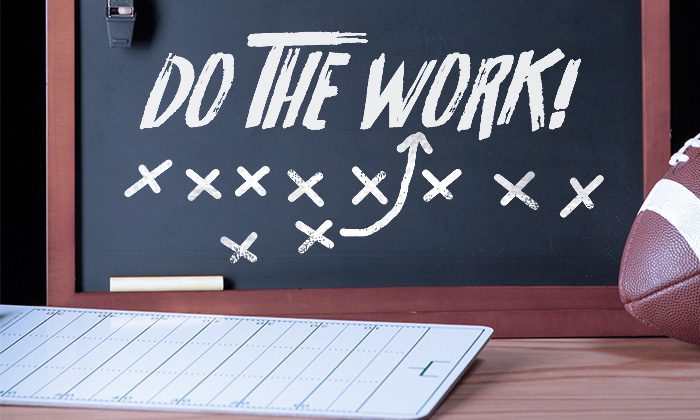Do the Work!
Selling intangible products is hard! I’ve never seen a customer so excited about buying a vehicle service agreement that they can’t wait to show it to their friends. Selling intangible products requires discovering and helping the customer see their need for the product. You must make the product and its benefits come alive by painting a picture and putting the customer in that picture using the product. It’s a unique skill set that must be developed by researching the products and role playing the effort to move customers to buy.
Like in football, F&I managers need to establish an effective plan and strategy to get the results they want.
Great F&I managers are rarely operating on just the natural skills they were born with. It takes a lot of work and effort to become highly successful at selling intangible products — work that many are hesitant to commit to. Those who make the commitment can accomplish what others can’t.
Success is no accident. It is hard work, perseverance, learning, practicing, sacrifice and love of what you are doing. One of the most powerful things we can provide as independent agents (a.k.a. coaches) is the framework and accountability structure to assure those we influence to “do the work” to be successful. As Pro Football Hall of Famer (and arguably No. 1 NFL player of all time) Jerry Rice once said,
Today I will do what others won’t, so tomorrow I can accomplish what others can’t.
I am an avid SEC college football fan so I like to use those letters as an acronym as often as I can. Here are three components of an effective strategy to assure those we are coaching are doing the work to get the results everyone is looking for:
S is for Schedule
Schedule practice consistently through the month. Anything that is important must be scheduled. Provide a “growth calendar” that includes several specific assignments each week. It can include role-play sessions, research or team-building exercises, all of which turn professional growth from an occasional effort to an ongoing process.
All professionals practice, in sports and in business. Every individual comes to the table with natural abilities and a foundation of skills they were born with. And yet, very often, I see less talented individuals outperform the naturally talented because they are willing to do the work to be great at what they do.
As coaches, providing this growth calendar to those we work with can be one of the most important tools to drive success. Once this is in place, we must follow up with intentional effort to assure the work is being done.
E is for Effort
Everyone tracks performance, and the goal is record-setting performance, right? However, one of the great illusions in our industry is focusing more on the outcome instead of the process. A healthy and consistent process will do more to improve performance than almost anything else we do. If the process is right, the results will follow.
Holding people accountable for the effort they are exerting to improve their skills on a weekly basis will ensure that improvement is taking place. Demanding improvement in performance absent of an accountable training process leads managers to seek increases in production through less desirable ways. That might include exerting pressure on customers to buy and can even lead some to use deceptive or questionable efforts. When effort is tracked, performance improves.
C is for Connect
We must connect results to the execution of the process. With new skills learned and consistent practice in place, the F&I manager knows where they need to go and how to get there.
Knowing what to do is often the easy part; doing it is the hard part. Accountability is simply monitoring to assure the new skills and actions that will bring success are executed in real customer interactions. Attending a class and implementing regular skills practice won’t lead to execution success any more than having a fitness magazine on the coffee table will lead to losing weight. It’s all about execution.
Coaching a team to success includes scheduling regular practice, tracking all team members efforts to improve and measuring the level of execution during the game. That will lead to wins in college football and in the F&I office as well!
Find more great resources & articles here.
This blog article was also published on Agent Entrepreneur.

